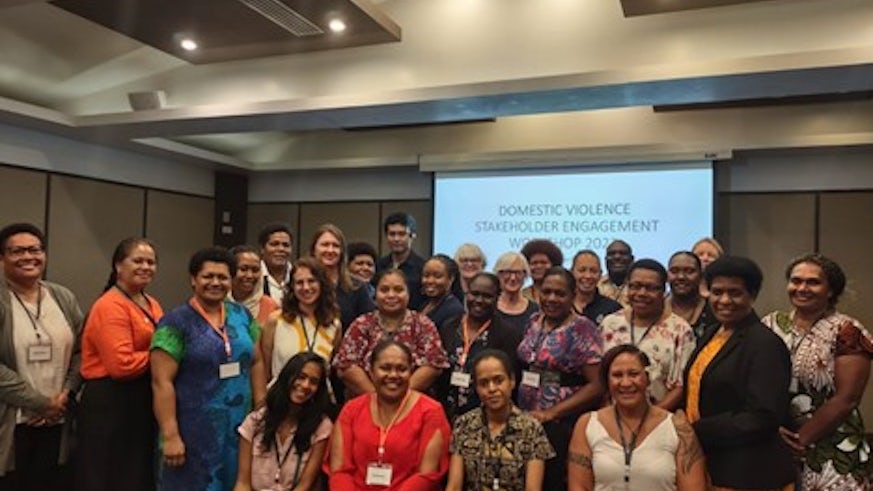International domestic violence ‘Talanoa’ brings specialists together from Melanesia
19 June 2023

An international collaboration between academics at the Security, Crime, and Intelligence Innovation Institute at Cardiff University, the University of the South Pacific and Queensland University of Technology has provided an opportunity for specialists to share knowledge and best practices in relation to responding to family and domestic violence in Melanesia.
‘Talanoa’, derived from the Fijian, Samoan, and Tongan languages, translates to "talk" or "discussion." It represents a unique style of dialogue found in the Pacific Islands, where individuals come together to openly exchange differing perspectives, free from any predetermined pressure to reach a consensus. In Talanoa, participants themselves establish the guidelines for their conversations, emphasizing values such as inclusivity, reconciliation, and mutual respect.
The Talanoa were funded by the Global Challenges Research Fund along with the Australian Institute of Police Management, were held on 27-28 March 2023 in Suva, Fiji. Attendees included approximately 20 key frontline and regional stakeholders from Fiji, Papua New Guinea, Solomon Islands and Vanuatu representing police, government and NGOs providing services to victims of family and domestic violence (FDV).
Country representatives unanimously recognised the importance of collaborative efforts among local partners to deliver effective, efficient, and well-coordinated services for FDV survivors. While all countries have established referral pathways involving various stakeholders such as NGOs, health institutions, courts, churches, police, safe houses, and government departments, the specific arrangements vary depending on the context. For instance, churches play a significant role as partners in the provinces of Solomon Islands, while Fiji relies on nurses' offices as primary points of contact in the absence of police officers. Vanuatu has authorized personnel identified by legislation to act in areas with limited resources for proper implementation of referral pathways.
Amanda Robinson, Professor of Criminology at Cardiff University and one of the organisers of the Talanoa, reflected on the event -

Establishing effective multi-agency approaches to address the harms caused by domestic and sexual violence is a significant global challenge. Attendees from four island nations represented at the workshops put this into sharp focus, while at the same time conveying the absolute determination and innovation that is characteristic of so many frontline practitioners working in this area.
Co-Director of the Security, Crime and Intelligence Innovation Institute
Director, Universities' Police Science Institute
She continued - "These events provided a rare opportunity for people working in extremely challenging contexts to consider what is working well in their countries in addition to exploring actionable directions for improving responses to FDV in the Pacific, which will be developed further in the future.”
Participants drew attention to the fact that available services for FDV survivors are concentrated in urban centers with little to no support from the state, civil society, or development partners in rural, maritime or remote areas. Despite the ease of identifying non-state mechanisms in areas away from urban centres, engagement with such support networks was either described as unclear or problematic due to non-regulation or non-referencing in existing country guidelines on service delivery partners and pathways. These types of collaboration, while deemed necessary and often in the best interest of survivors, reflect the highly discretionary nature of service provision in some local areas.
Danielle Watson, Associate Professor at Queensland University of Technology and another organiser of the event, described it as another small step in the right direction in the fight against domestic violence - “The conversations over the two days were as insightful as they were confronting."
Stakeholders working in the domestic violence space across the region truly work against the tides to do the best they can with the limited resources at their disposal. I am inspired by the commitment and resilience echoed in all of the discussions and I look forward to continued engagement aimed at preventing and better responding to domestic violence.
The workshops showcased several innovative initiatives, including civilian police groups reaching hard-to-reach communities in Vanuatu, elimination of violence against women committees holding authorities accountable in Fiji, agreed service standards and multi-agency data templates in the Solomon Islands, a network of Family Sexual Violence Units in Papua New Guinea, gender-sensitization training by organizations like Fiji Women's Crisis Centre, and training for church and cultural elders across all four countries to contribute to the overall response to FDV.
Sara N. Amin, Senior Lecturer of Sociology at The University of the South Pacific, shared: “The discussions underscored the need to recognize and support the extensive local expertise and solutions that have been developed by stakeholders working in the domestic violence space in Fiji, PNG, Solomon Islands and Vanuatu. Stakeholders also highlighted the need to examine to what extent current responses by the criminal justice system are working to reduce recidivism among domestic violence perpetrators.”
To learn more about this project, click here.



